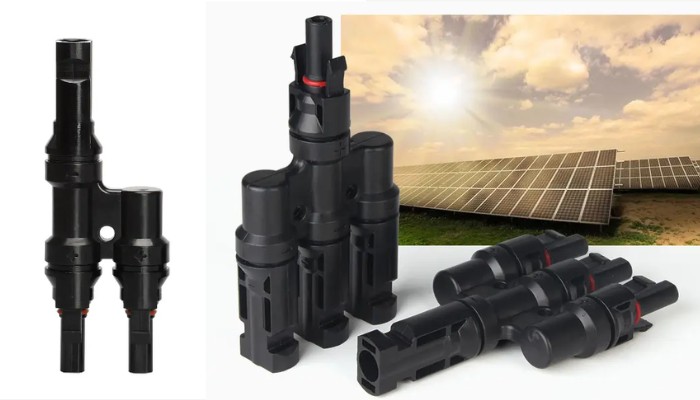No, not all MC4 connectors are the same. The National Electrical Code (NEC) and the UL6703 standard for PV connectors require that connectors be of the same type and brand to avoid cross-mating, which may pose a serious safety hazard.
Because there is no unified industry standard for PV connectors, there may be differences in shell design, electrical contact materials, and size specifications between different suppliers. These differences may not only cause system failures but also make related issues void of warranty.
Therefore, to ensure the safety and reliability of the solar system, it is necessary to choose matching MC4 connectors. Next, we will expand on this topic and explain in detail some types of MC4 connectors and how to choose the right connector.
Table of Contents
ToggleWhat is an MC4 connector?
The MC4 connector is a specialized electrical connector designed specifically for photovoltaic (PV) solar systems. MC4 stands for “Multi-Contact, 4 mm” and refers to the diameter of the contact pins. These connectors are widely used in the solar industry to create secure, weatherproof connections between solar panels and other system components, ensuring reliable and efficient transmission of direct current (DC) power.
MC4 connectors are designed to withstand harsh outdoor conditions, including exposure to ultraviolet (UV) radiation, extreme temperatures, and moisture. MC4 connectors are typically rated up to 1500 V DC and can handle up to 50 amps, depending on the size of the cable used.
MC4 connector diagram

The MC4 connector assembly consists of the following main parts:
Positive connector: The part that connects to the positive wire is marked with a plus sign (+). The positive connector usually has a protruding metal pin.
Negative connector: The part that connects to the negative wire is marked with a minus sign (-). The negative connector usually has a recessed metal socket.
Locking mechanism: Illustrates the clips on the sides that lock the connectors together to ensure a secure connection.
Cable gland: Shows the end of the connector where the wires enter, usually with a tightening nut to secure the cable.
Seal ring: Indicates the rubber gasket or seal inside the connector that prevents water intrusion.
Crimp wire: refers to the wire that is connected to the metal pin/socket inside the MC4 connector by crimping.
It is important to note that the diagram should clearly label each component, and the positive and negative connectors should be aligned with arrows indicating how they connect.
MC4 connector types

MC4 Connectors
MC4 connectors are the most commonly used connectors in today’s solar installations. They feature a secure snap-on locking mechanism that ensures a reliable connection between solar panels and other system components.
MC4 connectors are weatherproof, UV-resistant, and can handle high currents, making them suitable for both residential and commercial solar installations. They are widely adopted because they are durable, easy to use, and meet safety standards such as the National Electrical Code (NEC).
MC4 Branch Connectors
MC4 branch connectors are specialized versions of the standard MC4 connectors that are used to split or combine solar panel connections. These connectors can be a great choice for larger solar installations that require multiple solar panels in parallel or series-parallel configurations.
By simplifying the connection process, MC4 branch connectors help maintain a neat and organized setup, reduce the number of wires required, and ensure consistent voltage and current levels throughout the system.
MC4 to MC4 Adapters
MC4 to MC4 adapters are used to connect different types or sizes of MC4 connectors in a solar power system. These adapters are particularly useful when integrating panels or components from different manufacturers that may use slightly modified MC4 designs.
These adapters enable flexible system design and expansion by providing a seamless connection between different connectors to ensure compatibility and maintain system integrity.
MC4 In-line Diodes
MC4 in-line diodes are connectors that contain an integrated diode that is used to control the direction of current flow in solar systems. These diodes prevent reverse current flow, which can damage solar panels and reduce system efficiency.
In-line diodes are particularly useful in complex arrays where panels are connected in parallel to ensure that current flows in the intended direction and safeguard overall system performance.
MC4 Extension Cables
MC4 extension cables are pre-assembled cables with MC4 connectors on both ends designed to extend the distance between solar panels and other components such as inverters or charge controllers.
These cables provide flexibility in system design, allowing for optimal placement of panels and components without being limited by cable length. MC4 extension cables can help installations where panels are spread over a large area, ensuring reliable connections and efficient power transfer.
How should I choose an MC4 connector?

When choosing an MC4 connector for your solar power system, it’s important to consider several key factors to ensure compatibility, safety, and long-term reliability:
Compatibility with system components: Make sure the MC4 connector you choose is fully compatible with the solar panels, inverters, and other components in your system. Some connectors are designed specifically for certain cable sizes or panel configurations, so check the specifications carefully to avoid mismatches.
Voltage and current ratings: Choose an MC4 connector that meets or exceeds the voltage and current ratings required for your system. For example, standard MC4 connectors are typically rated up to 1500 V DC and can handle up to 50 amps, depending on the size of the cable used.
Weatherproofing and durability: Because solar installations are exposed to a variety of environmental conditions, choose MC4 connectors that are weatherproof, UV-resistant, and rated IP67 or higher. This ensures that the connector can withstand years of exposure to the elements without deterioration.
Safety features: Look for MC4 connectors with safety features such as locking mechanisms to prevent accidental disconnection that could result in arcing or other dangerous conditions. A proper locking mechanism also ensures that the connector remains securely fastened under various environmental stresses.
Compliance with standards: Make sure the MC4 connector you choose meets industry standards, such as those set by the National Electrical Code (NEC) and Underwriters Laboratories (UL). This not only ensures safety and reliability but also helps pass inspections and maintain warranties.
Manufacturer and brand reputation: Finally, consider the reputation of the manufacturer. For example, MOREDAY is well known for its high-quality MC4 connectors, which are widely used and trusted in the industry. Choosing a connector from a well-known brand can give you greater peace of mind that your solar system’s longevity and performance
By considering these factors, you can choose the right MC4 connector to ensure that your solar installation is safe, efficient, and reliable for years to come.
Summary
In summary, while MC4 connectors may look similar at first glance, they are not the same. Differences in design, materials, and manufacturing quality can significantly affect the performance and safety of your solar system. Choose an MC4 connector that is compatible with your system components, correctly rated for voltage and current, and able to withstand the environmental conditions to which it will be exposed.
MOREDAY’s MC4 connectors meet industry standards, and they have a variety of MC4 connector types to choose from, ensuring a stable, waterproof electrical connection. MC4 solar connectors have a product life of 25 years, are customizable, and are delivered quickly. Contact us now to get an accurate quote!
FAQ
How do l identify my MC4 connector?
To identify an MC4 connector, look for key markings on the connector itself, such as the brand name or model number, which is usually printed on the plastic housing.
Also, check the physical characteristics of the connector, such as the diameter of the contact pins (4 mm for MC4) and the presence of a locking mechanism, which is a distinguishing feature of MC4 connectors. If you are unsure, compare your connector to the product specifications or consult the manufacturer’s documentation to ensure compatibility and safety.
Are MC4 connectors interchangeable?
MC4 connectors are not generally interchangeable with connectors from different manufacturers or different models of connectors from the same brand. This is because the designs, materials, and manufacturing standards vary slightly and can result in poor connections or safety issues if they do not match.
It is important to use connectors from the same brand and series to ensure a safe and secure connection and to comply with safety standards.
Related reading: Are MC4 Solar Connectors Waterproof


